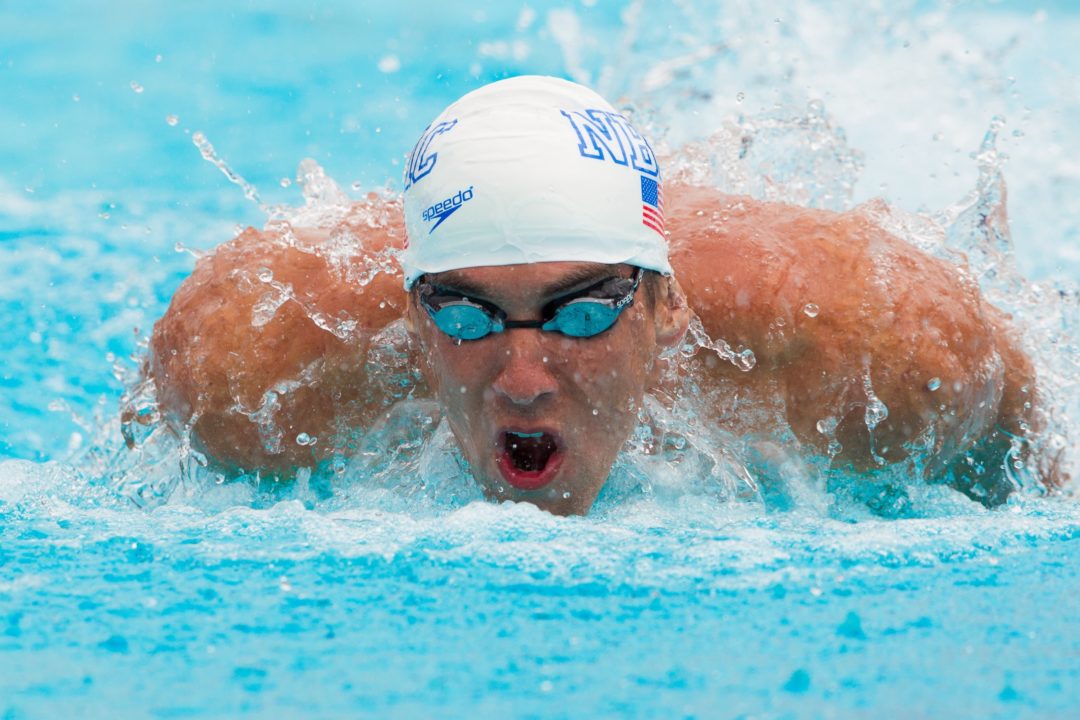Any champion in any sport will tell you the same thing: nobody ever wins anything that matters without a few breaks along the way.
At the 2008 Summer Olympics, en route to his record-setting 8 gold medal haul, Michael Phelps had more than one of those breaks. The two most iconic moments of the Games, and arguably swimming history, were Michael Phelps’ incredulous finish in the men’s 100 fly against Milorad Cavic, and Jason Lezak’s come-from-behind victory over the French in the men’s 400 free relay.
They were the two moments that left the hearts of American swim fans pounding for hours; sent them to their cell phones just to find anybody to tell about it; and inspired a generation of young swimmers.
But for every good break for one side of a race, there is someone who gets a bad break and is left with heartbreak.
This year, the Americans have twice been returned the favor in mirror-images of the two legendary moments from Beijing.
In the 400 free relay, the Americans this time entered the water with a lead of the French. With Ryan Lochte on the end, it was a lead that seemed like it would be hard to overcome. But that is because nobody had yet realized the sort of meet that France’s anchor Yannick Agnel was going to have in this meet. He exploded off of the last wall and reversed the tables, giving the French the most thrilling Olympic performance in their history.
The second race came in Tuesday’s 200 fly. Though it wasn’t exactly the same race as the 100 we saw in Beijing, it was the same stroke, and looked very much the same coming down to the wall. This time, however, it was Phelps who finished on a long stroke, while South African Chad le Clos took a final quick stroke to sneak his fingers into the wall, winning by just .05 seconds.
Without attachment to the great Phelpsian performance in Beijing, these moments for most sports fans will be stored away, recalled perhaps with vague recollections about the “kid who beat Phelps”. But for the swimming communities in those countries, these comeback victories will loom as large as even the moments of Phelps from 2008.
And that’s what the Olympics are all about. Taking the joy and enthusiasm of one country, and spreading it around to the globe to lift the whole of the sport. Americans can now relate to French fans, and South Africans to Americans. These emotions and the medals are spread to different countries and infused into their cultures in a bit of rebalancing of the Olympic spirit. In 2008, Michael Phelps dominated and that lit up the American swimming community. Now the French swimming community is lit up. That’s what makes the Olympics fun.

wow so well written braden.. n totally agree w/@jakeshell there!
funny thing is i still remember feeling all the giddy joy at how michael & the boys ‘smashed the frenchies’ in those beijing & rome relays… not to mention michaels 2 memorable wins over cavic…
but strangely enuf i found myself feeling something for the french team when they finally redeemed themselves this time round.. the shocker was how i actually felt kinda relieved & quite happy for them.. hmmm even appreciated yannick’s fantastic leg in out lezaking us lol! (after getting over the disappointment of us not making good on that unexpected initial lead of course :P)
i think maybe the french didnt seem to be so much… Read more »
I am glad I’m not from one of the swimming superpowers so I can always enjoy the great swims in the Olympics… no matter where they come from
Conner Dwyer had a great 200 leg of the relay, also swam strong in the 400, he’ll be one to watch in 2016; lots of young women who will be around again; and when you look at trials, there were a lot of college/just graduated swimers who look ready to step up and replace Phelps, Lochte, Grevers, Berens, Jones, etc.
Well said, Braden.
Nice article Braden
+1 !
I agree… this is one of Braden’s finest writing.
Competition like what we’re seeing in London is good for swimming. This is truly an international sport…the bigger it gets the better.
It is going to be a loooong 4 years, maybe even longer, because, who’s next? Where is/who is the next crop of youngsters? I haven’t noticed anything that eye popping at NCAA – for men that is.
Maybe it is a good thing that 4 years is a long time – time for US men to get crankin’! For now, at about the half way point, the men’s team, comparatively, jut looks old.
Oh, and do we think that timin of our US trials has anything to do with it????
The Aussies had how long between their trials and the Olympics? The US had 4 weeks. US swimmers have almost all made drops from trials. I think it is pretty cut and dry that nothing can be blamed on the trials timing.
I want to see some data that charts, by country, when they held trials, and see how close to their trials times their Olympic times were.
A significant number of the US athletes have swum better – mostly the women (Soni, Schmitt, Vollmer, Franklin). But Lochte, Adrian, ? have swum faster too. Phelps 200 fly was faster. Grevers was right at his time. Dwyer was faster.
I have been a skeptic about our trials timing, but I’m not convinced any other country is doing a great job. Agnel has been fast. But not Lacourt. Not Muffat.
Japan seems to be swimming well (except Kitajima). Germany is doing nothing.
China is doing well, but it is mostly… Read more »